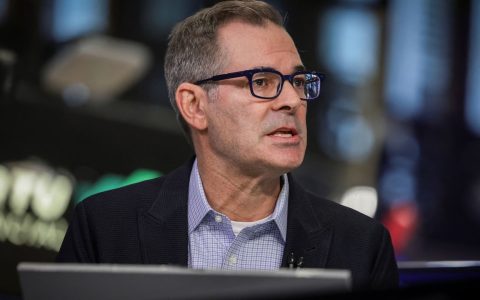
Nvidia CEO Jensen Huang delivers remarks next to U.S. President Donald Trump at an ‘Investing in America’ event in Washington, D.C., on April 30, 2025.
Leah Millis | Reuters
Nvidia CEO Jensen Huang is embarking on a strategically important trip to South Korea, a critical market for the chip giant, coinciding with a high-stakes meeting between U.S. President Donald Trump and Chinese President Xi Jinping.
Huang’s visit is expected to be a blend of business and diplomacy. On the agenda are potential discussions with President Trump, as well as meetings with top executives from South Korean powerhouses like Samsung and SK Group. This trip comes at a pivotal time as the global tech industry grapples with geopolitical tensions and escalating competition in the AI space.
Market analysts are keenly observing for any signals regarding Nvidia’s future prospects in China, a market that represents both immense opportunity and considerable risk.
Here’s a breakdown of key areas to watch this week concerning Nvidia.
Nvidia’s key suppliers
South Korea plays a crucial role in Nvidia’s supply chain as the home of SK Hynix, a primary supplier of High Bandwidth Memory (HBM). HBM is a specialized, high-performance memory component essential for Nvidia’s advanced AI systems.
Huang is slated to meet with SK Group Chairman Chey Tae-won, according to reports. SK Group is the parent company of SK Hynix. This meeting represents a strategic opportunity to discuss future HBM development and secure the supply of this critical component. The demand for HBM is projected to surge as AI applications become more prevalent, making this partnership even more strategically important.
While Samsung is also developing HBM, their product has not yet been certified by Nvidia. Huang acknowledged plans to meet with Samsung as well, suggesting potential discussions around the progress of Samsung’s HBM and potential future collaborations. Securing multiple suppliers for HBM would provide Nvidia with supply chain resilience and negotiating leverage.
Infrastructure and business deals
Huang’s recent global tour, spanning the Middle East, Europe, and Asia, has been marked by numerous infrastructure deals. These agreements underscore Nvidia’s commitment to supplying its advanced GPU-based products to data center projects worldwide. The demand for Nvidia’s GPUs in data centers is fueled by the exponential growth of AI and machine learning workloads.
Speaking on the sidelines of the Nvidia developers’ conference in Washington, Huang highlighted partnerships with Samsung and automaker Hyundai, specifically mentioning investments in “AI factories” – referring to advanced data centers optimized for AI workloads. This signals Nvidia’s intent to play a pivotal role in shaping the infrastructure landscape for AI development and deployment.
SK Telecom, another SK Group subsidiary, is currently expanding its data center footprint in South Korea. Nvidia is reportedly planning to supply its chips to SK Group for these projects, further solidifying their collaboration. This strategic partnership highlights the symbiotic relationship between chip manufacturers and telecom companies, both critical players in the AI ecosystem.
Beyond data centers, Nvidia could also announce plans in the autonomous vehicle and robotics sectors, both areas of intense focus for South Korea’s tech industry. Nvidia’s DRIVE platform for autonomous driving and its robotics platforms are gaining traction, presenting significant opportunities for collaboration with South Korean companies.
Trump meeting and China
Huang’s trip transcends mere business dealings. The geopolitical implications are significant, given its timing alongside the planned meeting between Trump and Xi in South Korea. This provides a unique backdrop for discussions about the future of technology development and trade relations between the U.S. and China.
President Trump has publicly praised Huang, calling him “an incredible guy” during a recent speech. Furthermore, Trump indicated his intention to meet with the Nvidia CEO, underscoring the importance of Nvidia in the U.S. economic and technological landscape.
This week’s events could offer vital insights into Nvidia’s strategic direction in China. Despite earlier restrictions on exporting AI chips to China being eased, allowing for the export of the downgraded H20 chip, reports suggest that Beijing is encouraging domestic companies to prioritize local alternatives.
Trump also hinted Nvidia’s Blackwell AI processors could be on the agenda with Xi. The Blackwell chip, Nvidia’s most advanced product, is currently restricted from export to China. This could signal a potential shift in policy, or a bargaining chip in broader trade negotiations.
“Trump wants to do business with China and he considers almost everything is business including Nvidia,” said George Chen, partner and co-chair of the digital practice at The Asia Group, highlighting the central role Nvidia plays in the U.S.-China relationship. “We may see China wants some sort of guarantee that the U.S. will not add location trackers into U.S. chips to be sold to China … The U.S. may also have its own demands in return, hence Nvidia now becomes one of the bargains for the two presidents in Korea.”
Previously, Chinese regulators have expressed concerns about the security of Nvidia chips. China remains a highly lucrative market for Nvidia, and exclusion has already resulted in significant financial losses for the company. Any signal of renewed access to the Chinese market would be a positive development for Nvidia’s financial outlook, but would likely come with significant political and security considerations.
Original article, Author: Tobias. If you wish to reprint this article, please indicate the source:https://aicnbc.com/11818.html



